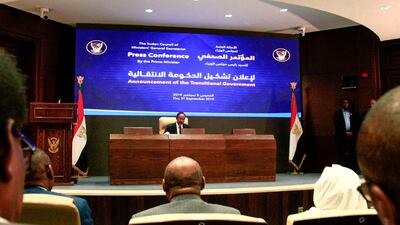Sudan finally has a government, the first since the removal of dictator Omar Al Bashir in April, with Prime Minister Abdalla Hamdok bringing together young blood, veteran activists and high-flying professionals in a team tasked with undoing the toxic legacy of 29 years of corrupt Islamist rule.
Next for Mr Hamdok’s transitional government is to end long-running wars in western and southern Sudan and overhaul a crippled economy while trying to win back the goodwill of an international community that has shunned Mr Al Bashir’s Sudan over its human rights record and links to terrorism.
It is a tough mandate made even more so because expectations are sky high among a people who have just triumphed over a brutal dictatorship that has over nearly three decades written one of Sudan’s darkest chapters, with seemingly endless strife, economic woes and corruption tearing it apart.
Mr Hamdok’s government, which will be sworn in within days, follows the creation last month of an 11-member sovereignty council to operate as a collective presidency during a 39-month transitional period. A 300-seat legislature is due to be in place by November. The three bodies are part of a power-sharing agreement signed on August 17 between the protest movement and the generals who succeeded Mr Al Bashir. It lays out how Sudan will be ruled until free elections are held in 2022.
The naming on Thursday of the government ministers was promptly recognised by the African Union, which restored Sudan’s membership the following day. The continental bloc suspended Sudan in response to the violent breakup by security forces of a protest encampment outside the headquarters of the armed forces in Khartoum June 3.
Mr Hamdok named only 18 of the envisaged 20 government ministers on Thursday. They included four women and represent almost all parts of Sudan. He said the remaining two seats would be given to ministers from eastern Sudan and the Blue Nine region south of Khartoum, areas which he said had long been overlooked in past governments.
“A new phase in Sudan’s history starts today,” said Mr Hamdok, an economist with many years of experience at UN agencies. “We are seeking an end to wars along with sustainable peace.”
The economy, devastated by years of mismanagement and corruption under Mr Al Bashir, is probably the biggest challenge to the new government.
Sudan’s foreign debt stands at about $55 billion (Dh202bn) and the new government is expected to ask for a significant portion to be forgiven. Mr Hamdok has said his country will need an initial $8bn to jump start the economy. The United Arab Emirates and Saudi Arabia have already pledged $3bn in April, soon after Mr Al Bashir’s removal, to help the economy stay afloat.
The prime minister said an end to the wars in western and southern Sudan would lead to significant cuts in defence spending, which currently eats up to 80 per cent of the state budget, making more funds available for education, health care and infrastructure.
The power-sharing agreement between the military and the protest movement stipulates that the government must focus on concluding peace agreements with rebels in these regions in its first six months. Mr Hamdok's decision to include representatives from all regions of Sudan could help to end the fighting against what was seen as a monopoly on power by an Arabised elite in northern and central Sudan under Mr Al Bashir.
The prime minister and his finance minister, Ibrahim Al Badawy, also spoke of overhauling the civil service, upgrading the country’s rickety infrastructure and combating inflation. But they provided no specifics on how they plan to do this.
“The 2020 budget will reflect the goals of the revolution,” said Mr Al Badawy, a World Bank economist. “We expect the following year’s budget to include the launching of projects to give added value to our exports.”
Removing Sudan from the US list of nations that sponsor terrorism is another priority for the new government, according to the prime minister.
“We are in a honeymoon with the world now,” he said, alluding to the warm reception to the power-sharing agreement and the offers of help from western powers to enable Sudan to successfully navigate the transitional period and return to the international fold.
“This climate will create sympathy with us and that will be helpful with a range of issues,” he said. “A democratic Sudan is not a threat to anyone.”
The United States in 1993 placed Sudan on a list of state sponsors of terrorism. Washington began the process of taking Sudan off that list in 2017, but it was put on hold when political unrest swept the country in December.


